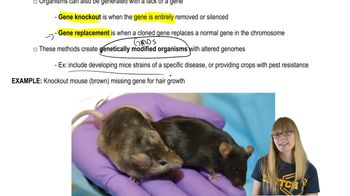Go to the National Institute for Child Health and Human Development (http://www.nichd.nih.gov), locate the search box at the top right corner of the homepage, and enter 'RUSP' to search for information on the Recommended Uniform Screening Panel. From the options that appear, select 'Brief History of Newborn Screening' and locate the discussion listing the criteria for adding a disease to the RUSP list. What are the criteria for listing a disease on the RUSP list?
Ch. 14 - Analysis of Gene Function via Forward Genetics and Reverse Genetics

Sanders3rd EditionGenetic Analysis: An Integrated ApproachISBN: 9780135564172Not the one you use?Change textbook
All textbooks Sanders 3rd Edition
Sanders 3rd Edition Ch. 14 - Analysis of Gene Function via Forward Genetics and Reverse Genetics
Ch. 14 - Analysis of Gene Function via Forward Genetics and Reverse Genetics Problem C.6c
Problem C.6c
 Sanders 3rd Edition
Sanders 3rd Edition Ch. 14 - Analysis of Gene Function via Forward Genetics and Reverse Genetics
Ch. 14 - Analysis of Gene Function via Forward Genetics and Reverse Genetics Problem C.6c
Problem C.6cChapter 14, Problem C.6c
Radiation is frequently used as part of the treatment of cancer. The radiation works by damaging DNA and components of the cell. Under what circumstances do you think radiation treatment is a good choice to treat cancer?
 Verified step by step guidance
Verified step by step guidance1
Understand that radiation treatment works by damaging the DNA of cells, which prevents them from dividing and growing. This effect is more pronounced in rapidly dividing cells, such as cancer cells.
Consider that radiation is a good choice when the cancer is localized, meaning it is confined to a specific area and has not spread extensively to other parts of the body. This allows targeted radiation to minimize damage to healthy tissues.
Recognize that radiation is often used when surgical removal of the tumor is not possible or as an adjunct to surgery to eliminate remaining cancer cells.
Evaluate the type and stage of cancer, as some cancers are more sensitive to radiation due to their cell cycle characteristics and DNA repair capabilities.
Take into account the patient's overall health and ability to tolerate radiation, as well as the potential side effects, to determine if radiation is an appropriate treatment option.

Verified video answer for a similar problem:
This video solution was recommended by our tutors as helpful for the problem above.
Video duration:
1mWas this helpful?
Key Concepts
Here are the essential concepts you must grasp in order to answer the question correctly.
Mechanism of Radiation Therapy
Radiation therapy uses high-energy radiation to damage the DNA within cancer cells, causing breaks in the DNA strands. This damage prevents the cells from dividing and leads to cell death, particularly affecting rapidly dividing cancer cells more than normal cells.
Recommended video:
Guided course

Transgenic Organisms and Gene Therapy
Cancer Cell Sensitivity and Tumor Characteristics
Radiation is most effective on tumors that are localized and composed of cells that divide rapidly. Tumors with well-defined boundaries and those that are radiosensitive respond better to radiation, making it a suitable treatment option in such cases.
Recommended video:
Guided course

Cancer Characteristics
Treatment Context and Patient Factors
Radiation therapy is chosen based on factors like tumor location, size, stage, and patient health. It is often used when surgery is not feasible, to shrink tumors before surgery, or to eliminate remaining cancer cells post-surgery, balancing effectiveness with minimizing damage to healthy tissue.
Recommended video:
Guided course

F Factor and Hfr
Related Practice
Textbook Question
424
views
Textbook Question
What are community-based genetic screening programs? What is the intent of such screening programs? Why are members of specific communities or populations offered the chance to participate in such programs?
550
views
Textbook Question
Do you think it is important that participation in community-based genetic screening be entirely voluntary? Why or why not?
479
views